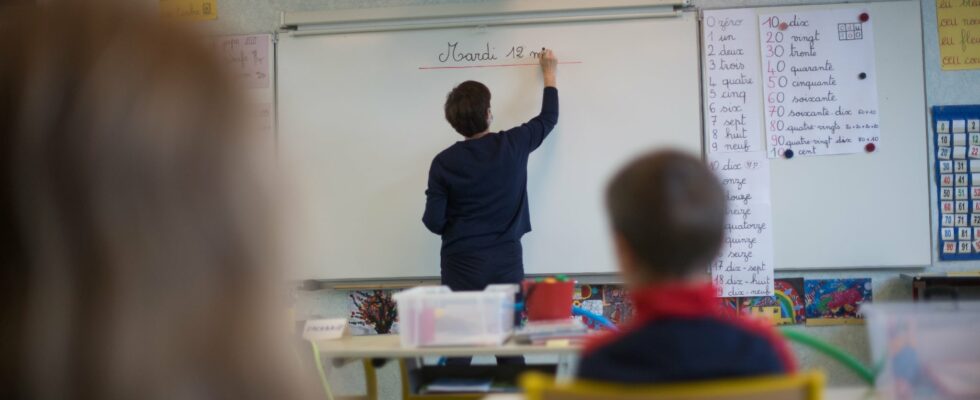“Thanks to the generative artificial intelligence, I can create small quizs that I submit at the start of the course to my students to assess their level of vocabulary. A huge time saving! It only takes me a few minutes of preparation where Formerly I could have spent three quarters of an hour there, “says Jean-Louis Marin-Lalmet, English teacher at the Lycée Saint-Exupéry in Bourg-Saint-Maurice. The teacher was able to test the new AI function of the Pearltrees Education platform before its official launch which took place this Tuesday, February 4. An additional tool intended to enrich the offer that this company already offered to 150,000 users, a third of secondary school teachers in France, since 2016. Their initial vocation? Allow their subscribers to bring together in a “educational cloud” different school content (web pages, exercises, instructions, organizational advice, manual extracts, etc.).
From now on, the teacher installed in front of his screen can use, in addition, at AI by pressing the “extend” button, to help him prepare his lessons. “As part of a lesson on the Renaissance period, for example, he will be able to access a more” territorialized “version and emphasize the city of Bordeaux if it is the place where he exercises” , explains Patrice Lamothe, the founder of Pearltrees. A math teacher can also ask the machine to provide him with some exercises on the functions by ensuring that they are adapted to the level of his secondary students. “The tool that we offer is only a” educational assistant “only there to help him perform certain often time -consuming tasks and allow him to devote himself to his essential mission which is to teach”, continues Patrice Lamothe.
The advantage of Pearltrees compared to other generative AIs such as Chatgpt, Copilot or Gemini? The company complies with the general regulations of the European Union on Data Protection (GDPR). “A point on which the ministry and the rectorate aware us a lot. At least we are quiet,” says Ludovic Chevassus, professor of history-geography at the Lycée du Golfe de Saint-Tropez, in the Var, who does not hesitate to vary experiences using different platforms. “Professional distortion obliges, when I do research, I always take care to multiply my sources” tells the one who warns his colleagues on the risks of disinformation. “The errors generated by generative artificial intelligences are multiple, hence the importance of remaining vigilant. The danger would be to believe that it is enough to copy the answer to our request and to say that the work is finished,” insists -Al.
The subject currently arouses many fears and reluctance in the education community. Mickaël Bertrand, author of the book I teach with AI (Vuibert editions, to be published on February 20), evokes this suspicion in the room of the teachers. “If one of us offers a summary note to prepare a meeting, it is not uncommon for others to wonder if it is the author. While in fact, whatever. If The note is well done and allows us to move forward, it is the main thing! “, He exclaims.
Personalized feedback
Most teachers say they are forced to get started, at least to try to counter cheating attempts by students who have become frequent. “Whether you decide to use it or not, it is important to be trained on these questions to be able to approach it in class,” insists Mickaël Bertrand. Clémence*, English professor in the Nice Academy, also sees it as a real professional interest at a time when we keep highlighting the importance of educational differentiation. “The AI allows me to make personalized feedback to the students. It is enough to enter their compositions and then collect suggestions which will help them to enrich their vocabulary or to perfect themselves in grammar,” she explains.
The dream, not always assumed, of many teachers: that generative AI one day corrects their copies in their place. “Here again, our tool only offers assistance to the teacher since it is obviously him that the final responsibility comes back to issue the note and the commentary,” insists Patrice Lamothe. In other words, AI aims to help him make a first opinion, better identify spelling mistakes or give an first impression on the style used in a text. The subject is sensitive. With the growing use of continuous control, the notes have become a central issue for families. “You should know that, according to the law, everyone has the right to ask public authority to review their file from the moment when an algorithm has been used to assess it,” warns Mickaël Bertrand.
Will the teaching profession escape the great fear of the moment: will the machine end up replacing them one day? In the Anglo-Saxon world, in particular, certain experiments are underway. “In France, it seems to me that we are relatively protected thanks in particular to our political leaders who are well aware of the dangers that this would generate,” said Mickaël Bertrand, taking the example of MOOCs (online training open to all): “When The phenomenon appeared, a few years ago, we were explained that it was going to revolutionize the academic world. And his colleague Clémence to acquiesce. “There is a creative side in teaching that cannot be delegated. I am very inspired by the way my groups of students work and adapt to me constantly with their particularities and their reactions,” said -She. Before adding: “We all remember a teacher who influenced us and set foot in the stirrup. That either, the AI will never be able to replace it”.
* The first name has been changed
.
